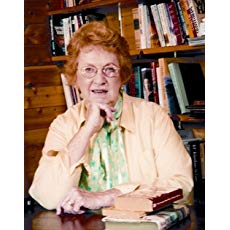In the twelfth in our series of previously-unpublished posts, Gladys Hunt cautions about “those words” our kids pick up at school, at play–and increasingly in books.
Watch Your Expletives! by Gladys Hunt
I try not to be the family grammarian, but I have teased my granddaughter (in-love) about the way she adds at to questions that begin with where. Where is a location word, so is at. It is redundant and awkward to ask, Where is it at? The question should be, Where is it? Besides technically, at is a preposition that needs a direct object, so it gets confused. I notice my grandson had adopted her habit because that is what we do; we talk like those around us. Now there is a new little person in that family listening to this anomaly. Wonder if she will pick it up?
 But in this blog I want to talk about careless words. It occurred to me the other day that I never heard either my father or my mother make a coarse remark. No big deal. It’s just that I remember that they spoke in a refined way—even when frustrated. I’m grateful. They called body parts by their real names, didn’t use unprintable words in their speech, and so none of my brothers or sister or I did either. One of my friends said, “Well, s*** happens!” Yeah, maybe. I’m sure it was cleaned up without calling it that in the home where I grew up. It wasn’t that my family was uptight about life and our human foibles and bodily functions. I think my parents simply had a respect for us as human beings and respect for language.
But in this blog I want to talk about careless words. It occurred to me the other day that I never heard either my father or my mother make a coarse remark. No big deal. It’s just that I remember that they spoke in a refined way—even when frustrated. I’m grateful. They called body parts by their real names, didn’t use unprintable words in their speech, and so none of my brothers or sister or I did either. One of my friends said, “Well, s*** happens!” Yeah, maybe. I’m sure it was cleaned up without calling it that in the home where I grew up. It wasn’t that my family was uptight about life and our human foibles and bodily functions. I think my parents simply had a respect for us as human beings and respect for language.
I remember when our son first asked me about words he heard at school and didn’t understand. He was only six, but he knew from the kids’ smirks and the way they laughed that there was something wrong with these words. So we went down the list together and talked about what they meant. Then I asked why he thought the kids thought what they said was funny, and why they used words like this. I liked his response. He said he thought it was because they didn’t know the right words to use and so they made up their own. I suggested that kids swear for the same reason. They don’t know better words.
You have to decide for your family how you will use questionable language—bathroom words, etc. It’s so “in” now to be free in expression. That’s what it is called. I would call it a limited understanding of language and responsibility for it! The other day I read a story about a professor who had overcome severe handicaps and was successfully motivating students to think outside the box in his science classroom. He sounded like a good man, but the interviewer went on to describe his “potty-mouthed” language. I thought, “He has one more handicap to overcome!”
There’s already enough coarseness flooding the airwaves and the screen. I don’t believe it brings freedom to us or our children to take part in this. It only degrades our lives. Instead, make up some metaphors that hit the nail on the head and challenge thinking. Since there are truly funny things to laugh about, and clever observations to be made, and a whole world to be enjoyed, why not elevate your family language to something more worthy.
When you hit your thumb with the hammer, you will have your own expression of pain. Maybe it’s more than “ouch!” but remember that little ears are listening and you are furnishing their lives with language. Maybe we should all adopt the outrageous statement of one of my male friends who shouts, “ZOUNDS!” It’s as good as any.
At RedeemedReader, we struggle with the issue of increasing profanity and vulgar language in books written for children. See Betsy’s thoughtful post on “Bad Words in Books” and continue to watch our language “cautions” in reviews.
Gladys Hunt wrote these blog posts for Tumblon.com, a web app that helped parents understand children’s development. Graham Scharf, one of the co-founders of Tumblon, has granted permission for these posts to be published here to achieve Gladys’s aim: for children and their parents to explore and enjoy great books together.
Please note: all affiliate links benefit Redeemed Reader and help us continue to offer opportunities like this!
Stay Up to Date!
Get the information you need to make wise choices about books for your children and teens.
Our weekly newsletter includes our latest reviews, related links from around the web, a featured book list, book trivia, and more. We never sell your information. You may unsubscribe at any time.
Support our writers and help keep Redeemed Reader ad-free by joining the Redeemed Reader Fellowship.
Stay Up to Date!
Get the information you need to make wise choices about books for your children and teens.
Our weekly newsletter includes our latest reviews, related links from around the web, a featured book list, book trivia, and more. We never sell your information. You may unsubscribe at any time.
We'd love to hear from you!
Our comments are now limited to our members (both Silver and Golden Key). Members, you just need to log in with your normal log-in credentials!
Not a member yet? You can join the Silver Key ($2.99/month) for a free 2-week trial. Cancel at any time. Find out more about membership here.
1 Comments
Leave a Comment
You must be logged in to post a comment.




“Zounds” is short for “God’s wounds” so I’m not sure that’s the best example of avoiding profanity. 😉